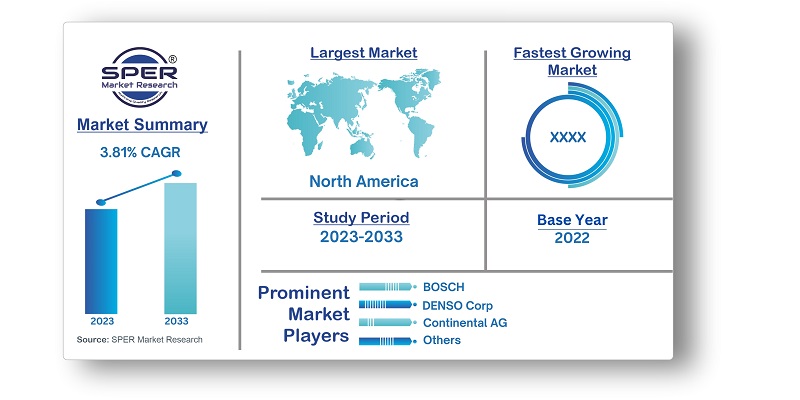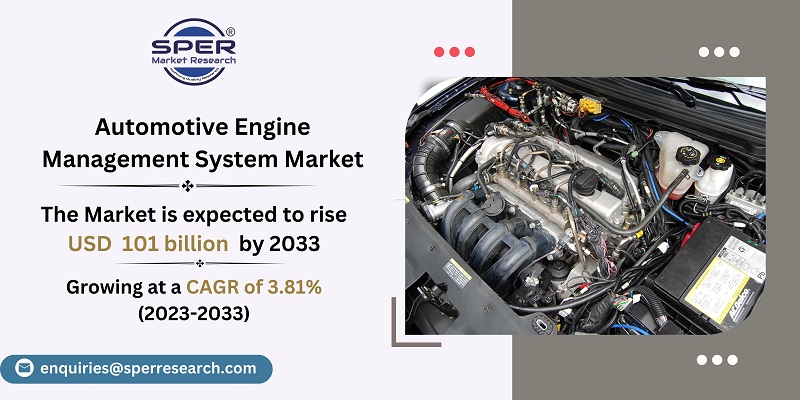
Automotive Engine Management System Market Growth, Size, Trends, Revenue and Future Outlook
Automotive Engine Management System Market Size- By Engine type, By Vehicle type, By Component, By Sensor type- Regional Outlook, Competitive Strategies and Segment Forecast to 2033
| Published: Jan-2024 | Report ID: AMIN2404 | Pages: 1 - 237 | Formats*: |
| Category : Automotive & Transportation | |||
- 2022: Dover Fueling Solution, a division of DOVER, has introduced a new technologically advanced hydrogen dispenser as well as its first-ever four-nozzle Wayne Helix compressed natural gas (CNG) fuel dispenser in Europe.
- 2021: In Selangor, Malaysia, the Denso Corporation subsidiary DENSO MALAYSIA is increasing its production capacity. The factory that makes the engine control units, electric power steering, airbag electronic control units, and air conditioning systems.


| Report Metric | Details |
| Market size available for years | 2019-2033 |
| Base year considered | 2022 |
| Forecast period | 2023-2033 |
| Segments covered | By Engine type, By Vehicle type, By Component, By Sensor type |
| Regions covered | North America, Asia-Pacific, Latin America, Middle East & Africa and Europe |
| Companies Covered | BOSCH, DENSO Corp., Continental AG, CONTINENTAL, DELPHI Automotive, HELLA, Hitachi Ltd Infineon Technologies AG, Sensata Technologies |
- Automobile Manufacturers
- Automotive Component Suppliers
- Automotive Mechanics and Service Centers
- Fleet Managers
- Investors and Financial Institutions
- Research and Development Organizations
- Regulatory Bodies
- Technology Providers
- Others
| By Engine type: |
|
| By Vehicle type: |
|
| By Component: |
|
| By Sensor type: |
|
- Global Automotive Engine Management System Market Size (FY’2023-FY’2033)
- Overview of Global Automotive Engine Management System Market
- Segmentation of Global Automotive Engine Management System Market By Engine type (Diesel engine, Gasoline engine)
- Segmentation of Global Automotive Engine Management System Market By Vehicle type (Commercial Vehicle, Passenger Vehicle)
- Segmentation of Global Automotive Engine Management System Market By Component (Engine Control Unit (ECU), Sensors)
- Segmentation of Global Automotive Engine Management System Market By Sensor type (Knock Sensor, Oxygen Sensor, Position Sensor, Temperature Sensor and Others.)
- Statistical Snap of Global Automotive Engine Management System Market
- Expansion Analysis of Global Automotive Engine Management System Market
- Problems and Obstacles in Global Automotive Engine Management System Market
- Competitive Landscape in the Global Automotive Engine Management System Market
- Impact of COVID-19 and Demonetization on Global Automotive Engine Management System Market
- Details on Current Investment in Global Automotive Engine Management System Market
- Competitive Analysis of Global Automotive Engine Management System Market
- Prominent Players in the Global Automotive Engine Management System Market
- SWOT Analysis of Global Automotive Engine Management System Market
- Global Automotive Engine Management System Market Future Outlook and Projections (FY’2023-FY’2033)
- Recommendations from Analyst
1.1. Scope of the report1.2. Market segment analysis
2.1. Research data source
2.1.1. Secondary Data
2.1.2. Primary Data2.1.3. SPER’s internal database2.1.4. Premium insight from KOL’s2.2. Market size estimation2.2.1. Top-down and Bottom-up approach2.3. Data triangulation
4.1. Driver, Restraint, Opportunity and Challenges analysis4.1.1. Drivers4.1.2. Restraints4.1.3. Opportunities4.1.4. Challenges4.2. COVID-19 Impacts of the Global Automotive Engine Management System Market
5.1. SWOT Analysis5.1.1. Strengths5.1.2. Weaknesses5.1.3. Opportunities5.1.4. Threats5.2. PESTEL Analysis5.2.1. Political Landscape5.2.2. Economic Landscape5.2.3. Social Landscape5.2.4. Technological Landscape5.2.5. Environmental Landscape5.2.6. Legal Landscape5.3. PORTER’s Five Forces5.3.1. Bargaining power of suppliers5.3.2. Bargaining power of buyers5.3.3. Threat of Substitute5.3.4. Threat of new entrant5.3.5. Competitive rivalry5.4. Heat Map Analysis
6.1. Global Automotive Engine Management System Market Manufacturing Base Distribution, Sales Area, Product Type6.2. Mergers & Acquisitions, Partnerships, Product Launch, and Collaboration in Global Automotive Engine Management System Market
7.1. Global Automotive Engine Management System Market Value Share and Forecast, By Engine type, 2023-20337.2. Diesel engine7.3. Gasoline engine
8.1. Global Automotive Engine Management System Market Value Share and Forecast, By Vehicle type, 2023-20338.2. Commercial vehicle8.3. Passenger vehicle
9.1. Global Automotive Engine Management System Market Value Share and Forecast, By Component, 2023-20339.2. Engine Control Unit (ECU)9.3. Sensors
10.1. Global Automotive Engine Management System Market Value Share and Forecast, By Component, 2023-203310.2. Knock Sensor10.3. Oxygen Sensor10.4. Position Sensor10.5. Temperature Sensor10.6. Others
11.1. Global Automotive Engine Management System Market Size and Market Share
12.1. Global Automotive Engine Management System Market Size and Market Share By Engine type (2019-2026)12.2. Global Automotive Engine Management System Market Size and Market Share By Engine type (2027-2033)
13.1. Global Automotive Engine Management System Market Size and Market Share By Vehicle type (2019-2026)13.2. Global Automotive Engine Management System Market Size and Market Share By Vehicle type (2027-2033)
14.1. Global Automotive Engine Management System Market Size and Market Share By Component (2019-2026)14.2. Global Automotive Engine Management System Market Size and Market Share By Component (2027-2033)
15.1. Global Automotive Engine Management System Market Size and Market Share By Sensor type (2019-2026)15.2. Global Automotive Engine Management System Market Size and Market Share By Sensor type (2027-2033)
16.1. Global Automotive Engine Management System Market Size and Market Share By Region (2019-2026)16.2. Global Automotive Engine Management System Market Size and Market Share By Region (2027-2033)
16.3. Asia-Pacific16.3.1. Australia16.3.2. China16.3.3. India16.3.4. Japan16.3.5. South Korea16.3.6. Rest of Asia-Pacific16.4. Europe16.4.1. France16.4.2. Germany16.4.3. Italy16.4.4. Spain16.4.5. United Kingdom16.4.6. Rest of Europe16.5. Middle East and Africa16.5.1. Kingdom of Saudi Arabia16.5.2. United Arab Emirates16.5.3. Rest of Middle East & Africa16.6. North America16.6.1. Canada16.6.2. Mexico16.6.3. United States16.7. Latin America16.7.1. Argentina16.7.2. Brazil16.7.3. Rest of Latin America
17.1. BOSCH17.1.1. Company details17.1.2. Financial outlook17.1.3. Product summary17.1.4. Recent developments17.2. Continental AG17.2.1. Company details17.2.2. Financial outlook17.2.3. Product summary17.2.4. Recent developments17.3. CONTINENTAL17.3.1. Company details17.3.2. Financial outlook17.3.3. Product summary17.3.4. Recent developments17.4. DENSO Corp.17.4.1. Company details17.4.2. Financial outlook17.4.3. Product summary17.4.4. Recent developments17.5. DELPHI Automotive17.5.1. Company details17.5.2. Financial outlook17.5.3. Product summary17.5.4. Recent developments17.6. HELLA17.6.1. Company details17.6.2. Financial outlook17.6.3. Product summary17.6.4. Recent developments17.7. Hitachi Ltd17.7.1. Company details17.7.2. Financial outlook17.7.3. Product summary17.7.4. Recent developments17.8. Infineon Technologies AG17.8.1. Company details17.8.2. Financial outlook17.8.3. Product summary17.8.4. Recent developments17.9. Sensata Technologies17.9.1. Company details17.9.2. Financial outlook17.9.3. Product summary17.9.4. Recent developments17.10. Sanken17.10.1. Company details17.10.2. Financial outlook17.10.3. Product summary17.10.4. Recent developments17.11. Others
SPER Market Research’s methodology uses great emphasis on primary research to ensure that the market intelligence insights are up to date, reliable and accurate. Primary interviews are done with players involved in each phase of a supply chain to analyze the market forecasting. The secondary research method is used to help you fully understand how the future markets and the spending patterns look likes.
The report is based on in-depth qualitative and quantitative analysis of the Product Market. The quantitative analysis involves the application of various projection and sampling techniques. The qualitative analysis involves primary interviews, surveys, and vendor briefings. The data gathered as a result of these processes are validated through experts opinion. Our research methodology entails an ideal mixture of primary and secondary initiatives.



Frequently Asked Questions About This Report
PLACE AN ORDER
Year End Discount
Sample Report
Pre-Purchase Inquiry
NEED CUSTOMIZATION?
Request CustomizationCALL OR EMAIL US
100% Secure Payment






Related Reports
Our Global Clients
Our data-driven insights have influenced the strategy of 200+ reputed companies across the globe.




















